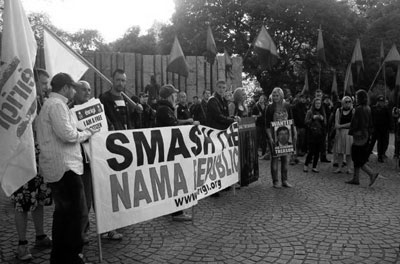Over 30 years of anarchist writing from Ireland listed under hundreds of topics
Thinking About Anarchism: Storming the Dáil
 If you’ve been following the news or listening to Liveline over the last few weeks, you’ll have seen a few references to protesters trying to “storm” the Dáil or to the Guards’ attempt to prevent an anti-capitalist march from, well, marching.
If you’ve been following the news or listening to Liveline over the last few weeks, you’ll have seen a few references to protesters trying to “storm” the Dáil or to the Guards’ attempt to prevent an anti-capitalist march from, well, marching.
The media, when it doesn’t completely ignore the left, flips like a moody teenager to the opposite extreme and hypes up protests as if a horde of Bolsheviks were about to ravage our civilisation. In the end, of course, it emerged that confrontations were being a bit over-hyped; the stormers of the Dáil weren’t looking to seize power and raise statues of Lenin. They just hoped to stage a sit-down protest in the Dáil car park.
The street protests occurring in Greece provided the backdrop for the reporting of these small protests. On our TV screens, we see a blazing conflict but, like the smaller and infinitely calmer demonstrations in Ireland, the reasons why our unhappy citizens feel the need to be on the streets rarely gets a mention. The focus is always on the confrontation, even when that is kicked off by police.
As readers of Noam Chomsky will know, the media is institutionally biased in favour of the right. Can anyone remember the last strike that got support from the newspapers? The media’s recent coverage of protests has mostly been confined to associating them with violence. This fosters the impression that if do you feel like protesting, you had better be prepared for some violence. As anyone who has attended protests in Dublin knows, there is as much chance of a row happening there as at your local bingo club.
Still, the reality of today’s world is that one of the few ways of reaching a mass audience is through the media so like it or loathe it, it can’t be ignored.
The desire to receive coverage puts pressure on organisers of demonstrations to make them sexy enough to warrant attention from the editors. Given a choice between covering a protest and a Z-list celebrity opening a chip shop in Mulhuddart, editors’ ingrained preference for the latter comes up trumps every time.
For this reason, you’ll often see NGO’s pull stunts when they want to highlight an issue. Otherwise they just wouldn’t get in the papers. The same pressures apply to the left, anarchists included. The necessity of receiving some of the oxygen of publicity requires that demonstrations aren’t just a mobilisation of whoever is immediately concerned about an issue, but are ones that attract media attention.
This is a problem. The whole socialist project depends on having mass support, even participation, in the creation of a more equal society. But how can such support be built up if the only realistic way of even being a blip on people’s radar is through a media that swings between cool indifference and manic scaremongering?
There is, unfortunately, no easy answer. Stunts and even the occasional minor bit of confrontation with the police can serve to garner a bit of attention. Even though we weren’t involved in the “storming” of the Dáil, the WSM’s website received a spike in visits after the Guards’ baton spree. No doubt the Socialist Workers Party, who were involved and who have competent spokespeople available to speak to the media, did much better. So, stunts aren’t without their uses, especially for a weak movement. However, we should be under no illusions that they are anything other than a sign of weakness.
And their impact depends on their novelty, so there’s a fairly tight limit on what they can achieve unless the level of confrontational is increased.
Escalating such confrontation is a tactic that runs counter to the WSM’s vision of socialism. A movement which revolved around stunts would never succeed in mobilising the numbers required to achieve real change. By their very nature, stunts separate the performers from the spectators and it was opposition to this division that led to the creation of anarchism in the first place.
While we are not pacifists, confrontation for the sake of mere publicity is not a wise move in itself. It alienates as much as it attracts. Some confrontation is necessary from time to time, if only because the state wishes to attack a popular movement and a movement which doesn’t defend itself is doomed to extinction.
For these reasons, stunts (or PR actions) have played very much a background role in our politics over the years. Apart from popularising anarchism itself, our emphasis is placed on work in unions and campaigns where everybody can make a contribution and see for themselves that collective action empowers them. Over the longer term, we have to create a left media so that we aren’t dependent on an inherently hostile press to deliver our message. The alternative is, when our existence is noted at all, to be the permanent bogeymen of the readers of the Irish Independent.

